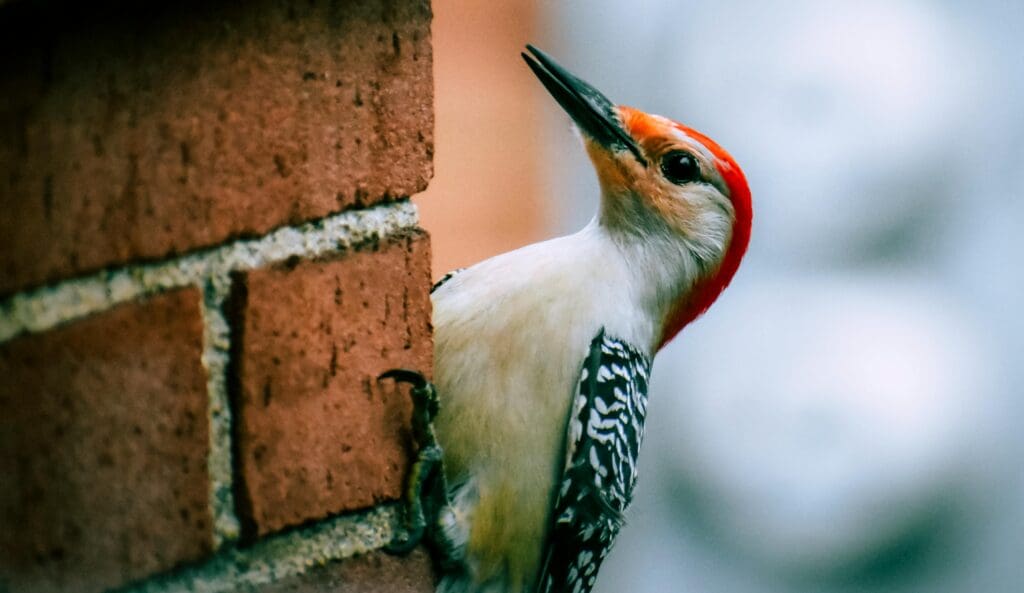Woodpeckers, with their distinctive drumming and fascinating behaviors, might be delightful to observe in the wild, but they can cause significant headaches for homeowners. These birds are notorious for pecking into wooden structures, often causing considerable damage to siding, eaves, and other wooden components of a home. If you’re dealing with this issue, you may have heard about the benefits of James Hardie siding. In this blog post, we’ll delve into how James Hardie siding, particularly its cement fiber siding, offers a robust, pest-resistant solution to protect your home from these persistent pests.

Understanding the Woodpecker Problem
Before we explore the solution, it’s essential to understand why woodpeckers target homes in the first place. Woodpeckers peck on wood for several reasons:
- Foraging for Food: Woodpeckers drill into wood to find insects and larvae.
- Creating Nesting Sites: They carve out cavities in wood to create nests.
- Marking Territory: The drumming sound produced by pecking is often used to establish territory and attract mates.
These behaviors, while natural, can lead to significant damage to wooden siding and structures, creating unsightly holes and compromising the integrity of your home. Repairing this damage can be costly and time-consuming. This is where James Hardie siding comes in.
What is James Hardie Siding?
James Hardie siding, also known as Hardie Board, is a type of cement fiber siding that has gained popularity for its durability, aesthetic appeal, and pest resistance. Composed of cement, sand, and cellulose fibers, this siding material offers a host of benefits over traditional wood siding.
The Benefits of Cement Fiber Siding
Cement fiber siding, particularly from James Hardie, is engineered to withstand a variety of environmental challenges, making it an excellent choice for homeowners looking to protect their homes from woodpeckers and other pests. Here are some of the key benefits:
- Durability: James Hardie siding is incredibly durable. Unlike wood, it doesn’t rot, warp, or become brittle over time. This resilience means that it can withstand the pecking of woodpeckers without sustaining significant damage.
- Pest Resistance: The composition of cement fiber siding makes it naturally resistant to pests. Woodpeckers are deterred by the hard, non-wooden material, which doesn’t provide the same appeal as traditional wood siding. Additionally, it is resistant to termites and other insects that might attract woodpeckers.
- Low Maintenance: Hardie Board requires minimal maintenance compared to wood. It doesn’t need frequent painting or staining, and it can be easily cleaned with a garden hose.
- Fire Resistance: Cement fiber siding is non-combustible, adding an extra layer of protection to your home.
- Weather Resistance: James Hardie siding can withstand extreme weather conditions, from heavy rain to strong winds, without deteriorating.
How James Hardie Siding Deters Woodpeckers
The key to understanding how James Hardie siding protects your home from woodpeckers lies in its composition. Woodpeckers are instinctively drawn to wood for the reasons mentioned earlier. However, cement fiber siding doesn’t provide the same tactile or auditory feedback that wood does when pecked. Here’s why James Hardie siding is effective:
- Material Hardness: The hard, dense structure of cement fiber siding makes it difficult for woodpeckers to penetrate. The beak of a woodpecker is designed to peck into softer wood, not the rigid surface of Hardie Board.
- Lack of Insect Habitat: Woodpeckers often peck at wood to find insects living inside. Cement fiber siding doesn’t harbor insects, removing a primary food source and reason for woodpeckers to target your home.
- No Hollow Sound: The drumming sound woodpeckers produce is vital for communication. Cement fiber siding doesn’t produce the same resonant sound as wood, making it less attractive for territory marking.
Real-Life Success Stories
Many homeowners have switched to James Hardie siding to protect their homes from woodpeckers and have seen remarkable results. One notable example is shared in the YouTube video by James Hardie, where a homeowner describes the transformation after replacing their damaged wood siding with Hardie Board. They highlight not only the cessation of woodpecker activity but also the enhanced curb appeal and reduced maintenance needs of their home.
Installation and Longevity
James Hardie siding is installed by professionals to ensure a perfect fit and finish. Proper installation is crucial to maximizing the benefits of cement fiber siding. Once installed, homeowners can enjoy decades of protection, as James Hardie products often come with extensive warranties, ensuring peace of mind and long-term value.
Environmental Considerations
In addition to its practical benefits, James Hardie siding is also an environmentally friendly choice. The production process of cement fiber siding involves sustainable practices, and the long lifespan of the material means less frequent replacement and reduced waste over time. For environmentally conscious homeowners, this adds another layer of appeal to choosing Hardie Board.
Conclusion
Woodpeckers can be charming to watch in nature but dealing with the damage they can cause to your home is far from pleasant. James Hardie siding offers a superior solution with its cement fiber composition, providing a durable, pest-resistant, and low-maintenance alternative to traditional wood siding. By choosing James Hardie siding, you can protect your home from pesky woodpeckers while also enjoying numerous other benefits such as enhanced fire resistance, weather durability, and aesthetic appeal.
If you’re tired of dealing with woodpecker damage and want a reliable, long-term solution, consider making the switch to James Hardie siding. Not only will you safeguard your home, but you’ll also invest in a product that adds value and beauty to your property. Say goodbye to woodpecker woes and hello to peace of mind with James Hardie’s cement fiber siding.
Contact Exterior Renovations today and declare war on those pesky woodpeckers!
